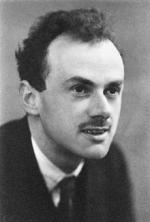Disable ads!
Paul Dirac
Quantum mechanics Uncertainty principle Introduction Glossary History Background Classical mechanics Old quantum theory Bra–ket notation Hamiltonian Interference Fundamentals Complementarity Decoherence Entanglement Energy level Measurement Nonlocality Quantum number State Superposition Symmetry Tunnelling Uncertainty Wave function (collapse) Experiments Afshar Bell's inequality Davisson–Germer Double-slit Elitzur–Vaidman Franck–Hertz Mach–Zehnder Popper Quantum eraser (delayed-choice) Schrödinger's cat Stern–Gerlach Wheeler's delayed-choice Formulations Overview Heisenberg Interaction Matrix Phase-space Schrödinger Sum-over-histories (path integral) Equations Dirac Klein–Gordon Pauli Rydberg Schrödinger Interpretations Overview Bayesian Consistent histories Copenhagen de Broglie–Bohm Ensemble Hidden-variable Many-worlds Objective collapse Quantum logic Relational Stochastic Transactional Advanced topics Quantum chaos Quantum computing Density matrix Quantum field theory Fractional quantum mechanics Quantum information science Relativistic quantum mechanics Scattering theory Quantum statistical mechanics Scientists Aharonov Bell Blackett Bloch Bohm Bohr Born Bose de Broglie Candlin Compton Dirac Davisson Debye Ehrenfest Einstein Everett Fock Fermi Feynman Glauber Gutzwiller Heisenberg Hilbert Jordan Kramers Pauli Lamb Landau Laue Moseley Millikan Onnes Planck Rabi Raman Rydberg Schrödinger Sommerfeld von Neumann Weyl Wien Wigner Zeeman Zeilinger v t e Paul Adrien Maurice Dirac OM FRS (/dɪˈræk/ di-RAK; 8 August 1902 – 20 October 1984) was an English theoretical physicist who made fundamental contributions to the early development of both quantum mechanics and quantum electrodynamics. He was the Lucasian Professor of Mathematics at the University of Cambridge, a member of the Center for Theoretical Studies, University of Miami, and spent the last decade of his life at Florida State University. Among other discoveries, he formulated the Dirac equation, which describes the behaviour of fermions and predicted the existence of antimatter. Dirac shared the Nobel Prize in Physics for 1933 with Erwin Schrödinger, "for the discovery of new productive forms of atomic theory". He also did work that forms the basis of modern attempts to reconcile general relativity with quantum mechanics. He was regarded by his friends and colleagues as unusual in character. Albert Einstein said of him, "This balancing on the dizzying path between genius and madness is awful". His mathematical brilliance, however, means he is regarded as one of the most significant physicists of the 20th century.
 Read more on wikipedia.org Read more on wikipedia.org
 All quotes by Paul Dirac All quotes by Paul Dirac
 Edit Edit
|

|
|
|
|
|
Background photo by Giuliana
|